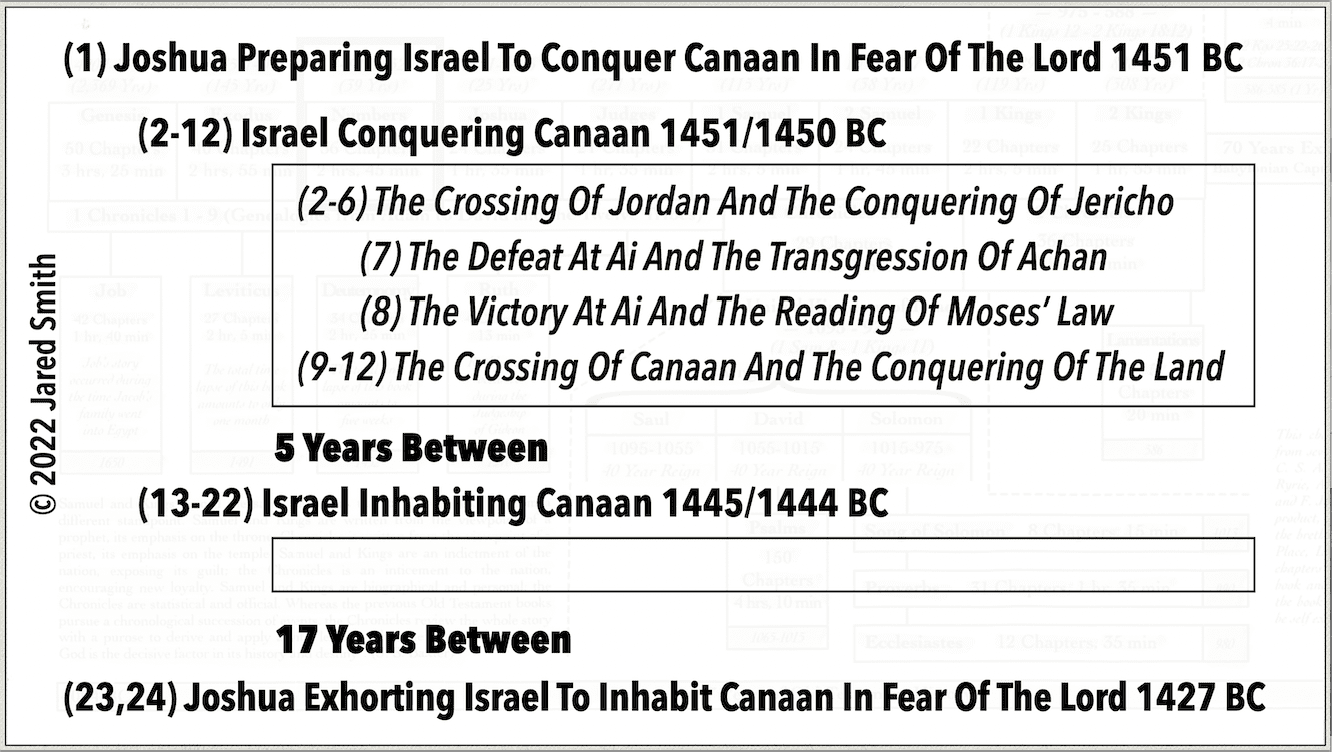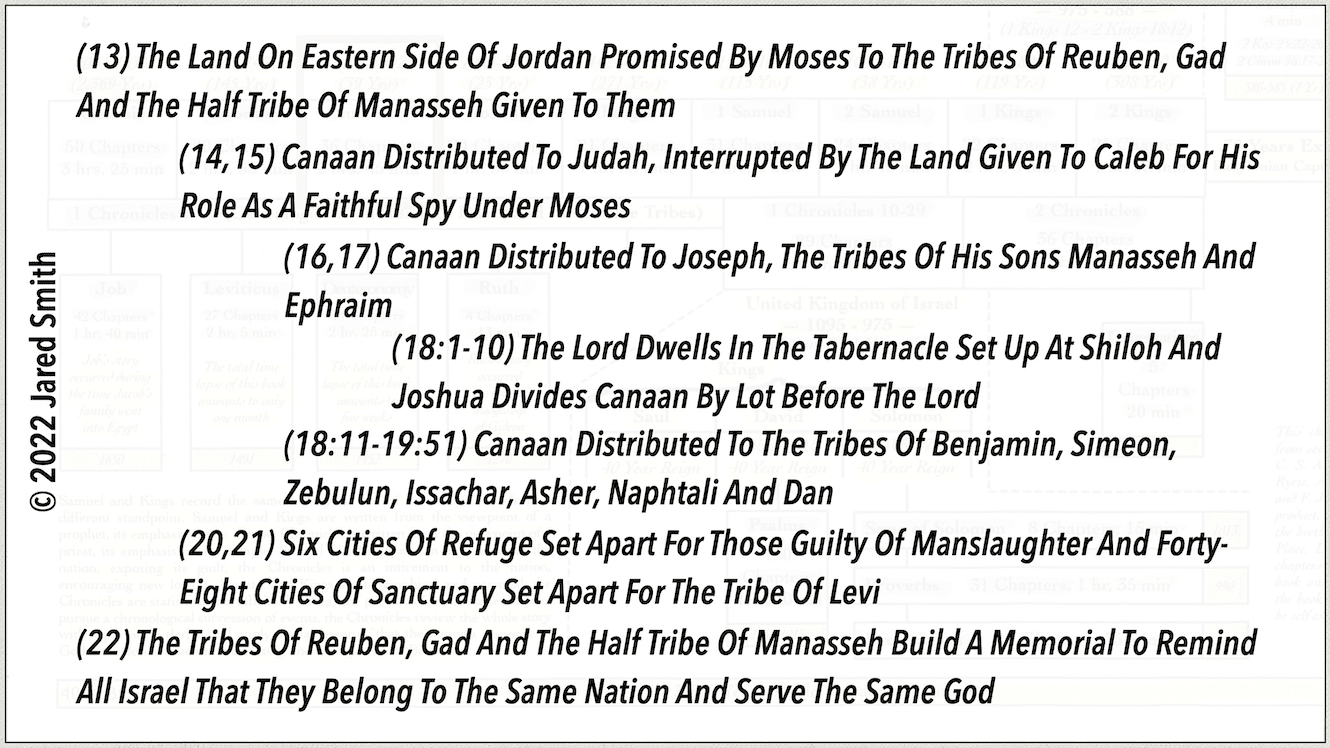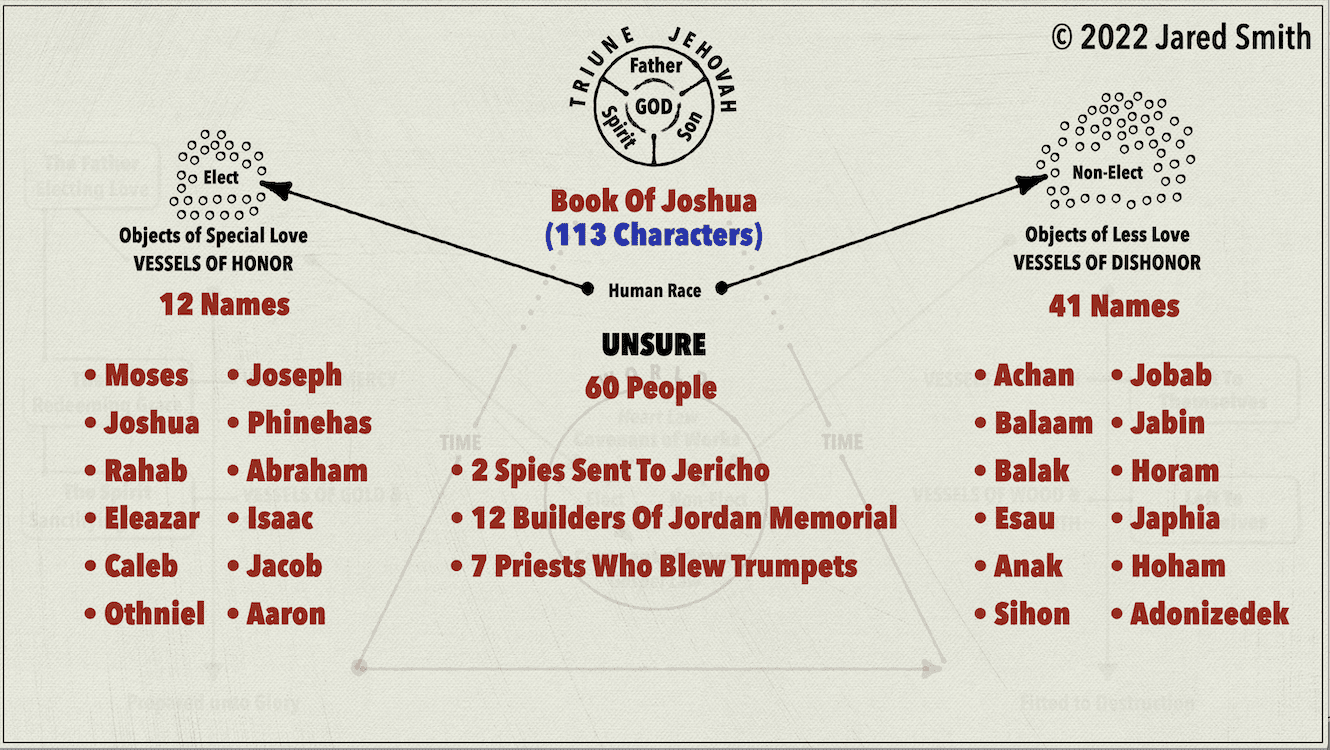20 Bible Reading – The Book Of Joshua
A Transcript Of The Video Study
According to the Chronological Chart Of Bible Books, Joshua is the seventh book which appears on the timeline. We believe it was written by Joshua, probably around the year 1427 BC, not long before his death. It is a divinely inspired book, meaning God breathed out His words through Joshua. The words of this book, therefore, are the words of God. They are able to make us wise unto salvation through faith which is in Christ Jesus. They are profitable for doctrine, for reproof, for correction, for instruction in righteousness, that we might be matured in the faith, throughly furnished unto all good works. (2 Tim 3:15-17)
The name ‘Joshua’ identifies the leading figure of the book—after the death of Moses, he became the new leader of the nation of Israel. However, the content of the book is much larger than that of a single person. It chronicles the children of Israel conquering the land of Canaan, and, its territories distributed to the various tribes of Israel. From this standpoint, a better name for the book might be—“Israel’s Conquest”.
The book covers a time period of around 25 years. It has been divided into 24 chapters, and it takes approximately 1 hour and 35 minutes to read in a single sitting.
There are four main sections to the book of Joshua:
In chapter 1, we have Joshua preparing Israel to conquer Canaan in the fear of the Lord. This occurred in the year 1451 BC.
In chapters 2-12, there is the record of the nation of Israel conquering the land of Canaan, occurring in the year 1451/50 BC. These chapters may be divided into four more sections:
In chapters 2-6, the nation of Israel crosses the river Jordan and conquers Jericho.
In chapter 7, Israel is defeated at a place called Ai, and the transgression of a reprobate sinner named Achan is discovered.
In chapter 8, Israel enjoys the victory over the people of Ai, and Joshua reads the entire law of Moses to the nation of Israel.
In chapters 9-12, the nation of Israel crosses Canaan and conquers the land.
Thus, we have Israel crossing and conquering in the first and last sections, with their defeat and victory at Ai in the middle sections. And what is of great interest is how the transgression of Achan in chapter seven is set against the reading of Moses’ law in chapter 8.
We then come to the third main section of the book, which occurs five years after the twelfth chapter. In chapters 13-22, we have the record of the nation of Israel inhabiting the land of Canaan, occurring in the year 1445/44 BC. These chapters may also be divided into further subheadings. However, as I am out of space with the onscreen notes, allow me to highlight the subsections on another page:
In chapter 13, the land on the eastern side of Jordan which had been promised by Moses to the tribes of Reuben, Gad and the half tribe of Manasseh is given to them.
In chapters 14 and 15, the land of Canaan is distributed to Judah, interrupted by land given to Calab for his role as a faithful spy under Moses.
In chapters 16 and 17, the land of Canaan is distributed to Joseph, between the tribes of his sons Manasseh and Ephraim.
In chapter 18:1-10, the Lord dwells in the Tabernacle set up at Shiloh and Joshua divides the remainder of Canaan by lot before the Lord.
In chapters 18:11-19:51, the land of Canaan is distributed to the tribes of Benjamin, Simeon, Zebulun, Issachar, Asher, Naphtali and Dan.
In chapters 20 and 21, six cities of refuge are set apart for those guilty of manslaughter, together with another forty-eight cities of sanctuary set apart for the tribe of Levi. Of course, this meant that throughout the land of Canaan, the social and religious laws of the nation of Israel permeated the land, which in turn encouraged the people to maintain civility and nurture a healthy respect for the Lord God.
In chapter 22, Reuben, Gad and the half tribe of Manasseh build a memorial to remind all Israel that though they live on the eastern side of Jordan, yet they remain one nation under God and servants of Jehovah.
Thus, once again, we discover an interesting interplay of ideas and events as they have been recorded for us in the content of these chapters.
We then turn to the fourth and final section of the book, which occurred around 17 years after the events recorded in chapter 22. In chapters 23 and 24, Joshua is exhorting the people to inhabit the land of Canaan in the fear of the Lord. This occurred in the year 1427 BC.
Now you see, here is the main structure of the book of Joshua. It opens and closes with Joshua encouraging the people to be in the fear of the Lord. And then, the two middle sections depict the nation of Israel doing just that—in chapters 2-12, they are conquering the land of Canaan in the fear of the Lord; and in chapters 13-22, they are inhabiting the land of Canaan in the fear of the Lord.
I want to take a few moments to underscore the importance of this leading theme—the fear of the Lord. Please notice, on the one hand, as they enter the land of Canaan to conquer it, the Lord spake unto Joshua in Joshua 1:1-9: “Moses my servant is dead; now therefore arise, go over this Jordan, thou, and all this people, unto the land which I do give to them, even to the children of Israel…as I was with Moses, so I will be with thee…have not I commanded thee? Be strong and of a good courage; be not afraid, neither be thou dismayed: for the LORD thy God is with thee whithersoever thou goest.” Joshua then commanded the officers of the people, saying—Joshua 1:11: “Pass through the host, and command the people, saying, Prepare you victuals; for within three days ye shall pass over this Jordan, to go in to possess the land, which the LORD your God giveth you to possess it.” And the people answered Joshua—Joshua 1:16-18: ”All that thou commandest us we will do, and whithersoever thou sendest us, we will go. According as we hearkened unto Moses in all things, so will we hearken unto thee: only the LORD thy God be with thee, as he was with Moses. Whosoever he be that doth rebel against thy commandment, and will not hearken unto thy words in all that thou commandest him, he shall be put to death: only be strong and of a good courage.” Do you see? The Lord encouraged Joshua to be in the fear of God, and Joshua encouraged the people to be in the fear of God, as they entered the land of Canaan.
But Joshua also encouraged the people to be in the fear of God as they inhabited the land of Canaan. Repeating to them the words spoken by God, Joshua said to them in Joshua 24:13-15: ”I have given you a land for which ye did not labour, and cities which ye built not, and ye dwell in them; of the vineyards and oliveyards which ye planted not do ye eat. Now therefore fear the LORD, and serve him in sincerity and in truth: and put away the gods which your fathers served on the other side of the flood, and in Egypt; and serve ye the LORD. And if it seem evil unto you to serve the LORD, choose you this day whom ye will serve; whether the gods which your fathers served that were on the other side of the flood, or the gods of the Amorites, in whose land ye dwell: but as for me and my house, we will serve the LORD.” And the people answered in Joshua 24:16-18: ”And the people answered and said, God forbid that we should forsake the LORD, to serve other gods; for the LORD our God, he it is that brought us up and our fathers out of the land of Egypt, from the house of bondage, and which did those great signs in our sight, and preserved us in all the way wherein we went, and among all the people through whom we passed: and the LORD drave out from before us all the people, even the Amorites which dwelt in the land: therefore will we also serve the LORD; for he is our God.” And so, the fear of the Lord would bring them into the land, and the fear of the Lord would preserve them in the land.
My dear friends, this is a lesson for you and I to glean—we too are to fear the Lord. We read in Proverbs 9:10: “The fear of the LORD is the beginning of wisdom: and the knowledge of the holy is understanding.” We read in Proverbs 14:27: ”The fear of the LORD is a fountain of life, to depart from the snares of death.” We read in Proverbs 19:23: ”The fear of the LORD tendeth to life: and he that hath it shall abide satisfied; he shall not be visited with evil.” We read in Proverbs 22:4: ”By humility and the fear of the LORD are riches, and honour, and life.” Now please understand, a fear of the Lord is a reverence for the Lord—a reverence to love the Lord, and honor the Lord, and magnify the Lord and glorify the Lord. This reverence is that which is imparted to the soul when the sinner is born again—it is that which characterizes the soul of a regenerate sinner. All of our endeavors and all of our recreational activities and all of our settlement in this world and in that which is to come, is driven by this reverence in our hearts for the Lord. And so, as the nation of Israel conquered the land and settled in the land as they feared God, so we wake up each day and conquer that which is set before us, and take our rest at night, in the fear of the Lord.
Let us now turn to the Framework of Sovereign Grace, and see how the characters of the book match up to God’s master plan for the ages.
According to my count, there are 113 characters recorded in the book of Joshua.
Twelve people belong to God’s elect—Moses, Joshua, Rahab, Eleazar, Caleb, Othniel, Joseph, Phinehas the priest, Abraham, Isaac, Jacob and Aaron.
Forty-one people belong to the non-elect, among which are Achan, Balaam, Balak, Esau, Anak, King Sihon, King Jobab, King Jabin, King Horam, King Japhia, King Hoham and King Adonizedek.
Sixty people are unknown as to which group they belong. Among this number are the two spies Joshua sent to Jericho, the twelve men who collected stone from the river Jordan and set up a memorial and the seven priests who blew trumpets when Jericho was besieged.
Now, I have already highlighted the testimonies of some of these people in previous studies. Not only is there not a need to go over that ground again in this study, but time doesn’t permit me to enter this subject at any length. I would therefore just like to suggest a few things which you can look out for when reading the book of Joshua this week.
First, look out for the testimony of Joshua. In the fifth chapter, he has a personal encounter with the captain of the host of the Lord which is none other than Christ Himself; in chapter 8 he builds an altar to the Lord and reads the entire law of Moses to the people of Israel; in chapters 23 and 24 he preaches a sermon to the children of Israel just prior to his death; in chapter 24 he establishes a covenant with Israel and sets up a stone as a witness between them and God.
Second, look out for the testimony of Rahab in chapters 2-6. She was a harlot in the city of Jericho who had been regenerated by the Spirit of God and ultimately delivered from that city before it was destroyed by the Israelites. Of course, her name is mentioned in Hebrews 11 along with many other saints of the Old Testament.
Third, look out for the testimony of Achan in chapter 7. Achan is the man who stole gold and silver from the spoils of Jericho, and what made his sin so grievous, is that God had set apart those treasures for the tabernacle.
Fourth, look out for the testimony of Balaam in chapter 13. This is the sorcerer recorded in the book of Numbers whose influence caused the children of Israel to commit adultery and blaspheme God through idolatry. He is mentioned again in this book of Joshua.
Fifth, look out for the testimony of Caleb in chapters 14 and 15. He was one of the twelve spies whom Moses sent into the land of Canaan, and he was only one of the two spies who gave a good report on the power and faithfulness of God. At that time, Moses promised to give Caleb the land of Hebron, which Joshua does give in chapter 14.
Sixth, look out for the testimony of Othniel. Othniel was the younger brother of Caleb and would later become the first Judge of Israel. He is introduced in chapter 16 as the man who valiantly conquered Debir, and as a result, was awarded the daughter of Caleb to wife.
Seventh, look out for the testimony of Eleazar. This was the son of Aaron and the high priest of Israel. Throughout the book he is participating with Joshua and the elders of Israel in the distribution of the land to the various tribes. His death is recorded in the last verses of the last chapter of the book.
Well, as tempting as it is to discuss these testimonies at greater length, I must bring this study to a close. I would like to wish upon you the richest blessings of the Lord as you read through the pages of the book of Joshua this week. If possible, read it in a single sitting. If necessary, divide the book into manageable sections and commit yourself to it so that you do not fall behind in your journey through the Word of God. I trust the notes I have given in this study will serve as a helpful guide as you work your way through the book, chapter by chapter.
Jared Smith served twenty years as pastor of a Strict and Particular Baptist church in Kensington (London, England). He now serves as an Evangelist in the Philippines, preaching the gospel, organizing churches and training gospel preachers.
Jared Smith's Online Worship Services
Jared Smith's Sermons
Jared Smith on the Gospel Message
Jared Smith on the Biblical Covenants
Jared Smith on the Gospel Law
Jared Smith on Bible Doctrine
Jared Smith on Bible Reading
Jared Smith's Hymn Studies
Jared Smith on Eldership
Jared Smith's Studies In Genesis
Jared Smith's Studies in Romans
Jared Smith on Various Issues
Jared Smith, Covenant Baptist Church, Philippines
Jared Smith's Maternal Ancestry (Complete)







